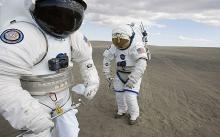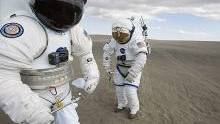Long distance space travel leaves you short, fat and ugly, claim scientists
Source: telegraph.co.uk
Making long space journeys, like those envisaged in the future, will not be good for your looks or figure, claim scientists who believe they will leave astronauts looking short, fat and bald.They believe living permanently in space for many years, perhaps even for many generations, adversely affects human's looks because they will not require any effort to move or keep warm.

Making long space journeys, like those envisaged in the future, will not be good for your looks or figure, claim scientists who believe they will leave astronauts looking short, fat and bald. Photo: NASA
Near zero gravity would leave humans stunted and cause their bones and muscles to be underdeveloped, said astrobiologist Dr Lewis Dartnell.
They will also have bloated faces and lose their hair because fluid would pool in their skulls and there would be no need for insulation from the cold.
Dr Dartnell, from University College London, admitted that by the time they reach their destination they may not pass an audition for Star Trek.
"With little effort required to move around in microgravity and an environment that is never too hot or cold, future spacemen and women are likely to become pretty chubby," he said.
"Without gravity, fluid would float up to pool in the skull, which would cause the head to look permanently swollen out of proportion.
"Also, with no need for hair to insulate the head or eyelashes to flick dust from their eyes, future humans may become completely hairless."
Speaking at the Cheltenham Science Festival, Dr Dartnell also addressed the question of what aliens on other worlds might look like.
He said: "Certain features of the human body, such as camera-like eyes, head, and legs would evolve time and time again on different worlds, and so many features of alien animals are likely to be instantly recognisable. "However other features of life, such as the number of limbs animals develop, or the shape and colour of trees, would be much more variable between worlds."
The Kepler space telescope was launched earlier this year and is expected to find dozens of Earthlike planets orbiting distant stars.
Some of these could host complex life. But even the nearer stars are so far away that travelling to them could take generations.
By the time the first humans arrive on an extrasolar planet, any aliens they meet are likely to find their appearance a shock.

Source: Telegraph.co.uk






















